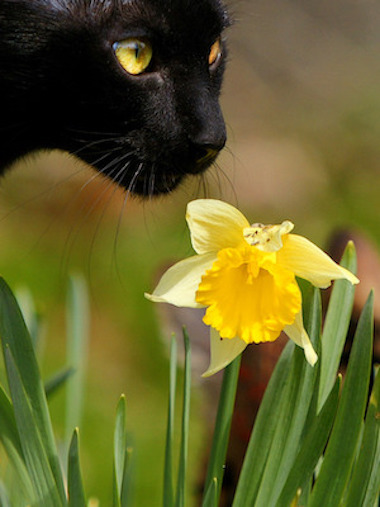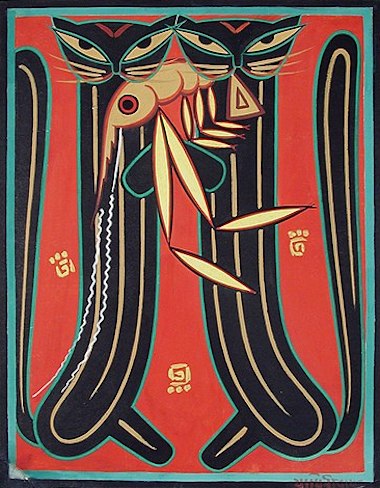
|
|
|
|
|
| Issue 18: | 29 Apr. 2023 |
| Halfaku: | 5 words |
| Senryu: | 8 words |
By Amita Paul
Two Tiny Poems

Spring
I could eat you

prawn is drawn
halved and quartered
cat cuisine
Publisher’s Notes:
Links below were retrieved on 5 April 2023.
1. Photo of the black cat and daffodil above is by Unknown. This was a stock image in the UWPhoto ANS stock photo agency, which focused primarily on underwater marine photographs, and apparently went out of business in 2011. The image appears with no source info on several Pinterest and Facebook pages, and I was unable to locate it in major stock galleries.
2. Two-line haiku such as “Spring / I could eat you” are relatively rare. While haiku poets have been writing two-line verse with various numbers of syllables for some time, Amita Paul may be the first to refer to this form, a distich, as “halfaku.” Unlike the couplet, which is typically a two-line stanza grouped with others in a longer poem, the distich is a stand-alone poem. Speaking for myself, I get a kick outta the term halfaku.
See also the essay by David Grayson, “Writing Haiku: The Two-Line Form,” in Frogpond (Volume 38:3, 2015):
https://www.hsa-haiku.org/frogpond/2015-issue38-3/Grayson-2lineHaiku-Fp38-3.pdf
3. The second image above is an untitled painting (tempera on card, 1920) by Indian artist Jamini Roy (1887-1972). Referred to as Two Cats Holding a Large Prawn, the painting is held by the San Diego Museum of Modern Art. Image was downloaded from the public domain via Wikimedia:
https://commons.wikimedia.org/wiki/File:Two_cats_holding_a_large_prawn_%286124606539%29.jpg
As per Artnet, Jamini Roy “was best known for combining traditional Indian and Western art styles to create unique and complex works. ...They can be found in the collections of the Victoria and Albert Museum in London, the Harn Museum of Art at the University of Florida, and the National Gallery of Modern Art in New Delhi, among others.” And hundreds may be viewed online at Artnet:
https://www.artnet.com/artists/jamini-roy/
Amita Paul
is by profession a retired bureaucrat but at heart a poet and a teacher. Based in Patna (the educational center of the Bihar state of eastern India), she writes poetry in English, Urdu, Hindi, and Punjabi.
| Copyright © 2019-2025 by MacQueen’s Quinterly and by those whose works appear here. | |
| Logo and website designed and built by Clare MacQueen; copyrighted © 2019-2025. | |
|
Data collection, storage, assimilation, or interpretation of this publication, in whole or in part, for the purpose of AI training are expressly forbidden, no exceptions. |
At MacQ, we take your privacy seriously. We do not collect, sell, rent, or exchange your name and email address, or any other information about you, to third parties for marketing purposes. When you contact us, we will use your name and email address only in order to respond to your questions, comments, etc.